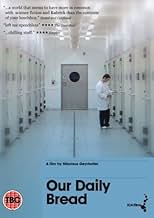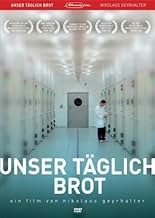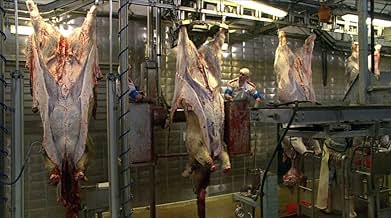IMDb-BEWERTUNG
7,5/10
2739
IHRE BEWERTUNG
Füge eine Handlung in deiner Sprache hinzuOUR DAILY BREAD is a wide-screen tableau of a feast which isn't always easy to digest - and in which we all take part. A pure, meticulous and high-end film experience that enables the audien... Alles lesenOUR DAILY BREAD is a wide-screen tableau of a feast which isn't always easy to digest - and in which we all take part. A pure, meticulous and high-end film experience that enables the audience to form their own ideas.OUR DAILY BREAD is a wide-screen tableau of a feast which isn't always easy to digest - and in which we all take part. A pure, meticulous and high-end film experience that enables the audience to form their own ideas.
- Regie
- Drehbuch
- Hauptbesetzung
- Auszeichnungen
- 4 Gewinne & 5 Nominierungen insgesamt
Empfohlene Bewertungen
This movie didn't show me anything I didn't already know, but it's silence gave me time to think about what is shown. Certainly not a movie for impatient people or after a hard day at work. It left me with a strong feeling: That industrial farming and breeding is just that - industrial. Certainly the slaughterhouse sequences touched me most. Treatment of the animals doesn't appear cruel, but very unnatural. Efficiency and detachment rule. Plants and animals don't grow and live anymore. They are produced and harvested. What's ultimately lost is the variety of life outside the human production-sphere and the human connection to the world.
The recent film "Fast Food Nation" imposes a fictional narrative onto the factual expose of Eric Schlosser's informative and horrifying book about (among other things) the industrialization of agriculture. The documentary "Our Daily Bread" makes no such concession to its audience's need for story, presenting virtually wordlessly scene after scene of modern food production in action.
It's a cliché at this point to note how modern consumers are alienated from their diets, making no connection between the plastic-wrapped pieces of muscle they purchase in the supermarket and the animals they were once part of. Still, Austrian director Nikolaus Geyrhalter presents dozens of memorable and fascinating images, not all of them of the gross-out variety. In fact, there's even an abstract beauty to some of what we see, at least until we realize it's all part of a vast killing machine.
Difficult to sit through, "Our Daily Bread" is nonetheless an important record, invaluable for those with the courage to watch it.
It's a cliché at this point to note how modern consumers are alienated from their diets, making no connection between the plastic-wrapped pieces of muscle they purchase in the supermarket and the animals they were once part of. Still, Austrian director Nikolaus Geyrhalter presents dozens of memorable and fascinating images, not all of them of the gross-out variety. In fact, there's even an abstract beauty to some of what we see, at least until we realize it's all part of a vast killing machine.
Difficult to sit through, "Our Daily Bread" is nonetheless an important record, invaluable for those with the courage to watch it.
The movie is a stunning visual documentary of modern day food production. There is no dialog - just visuals (with sound).
The video is taken from food production facilities in Europe. With the growth of the worldwide population, it is fascinating to see how streamlined (and a bit "freaky") food production has become. It's almost like watching factory assembly lines punching out one "widget" after another.
Sometimes it's disturbing to watch because the "widgets" are live animals or carcasses. These scenes made me really think about population expansion - it's very unsettling to think about how much this type of food production will have to be escalated to feed the growing masses.
If you are intrigued by mass production processes of basic vegetable and meat food supplies, this is a great film to see. It's a visual diary of the processes involved.
The video is taken from food production facilities in Europe. With the growth of the worldwide population, it is fascinating to see how streamlined (and a bit "freaky") food production has become. It's almost like watching factory assembly lines punching out one "widget" after another.
Sometimes it's disturbing to watch because the "widgets" are live animals or carcasses. These scenes made me really think about population expansion - it's very unsettling to think about how much this type of food production will have to be escalated to feed the growing masses.
If you are intrigued by mass production processes of basic vegetable and meat food supplies, this is a great film to see. It's a visual diary of the processes involved.
Don't watch this movie if you have bad stomach or you won't be able to eat for a while. It shows quite a bit of shocking footage of modern food processing facilities. Dehumanization of food processing is well shown by creative camera placement. Camera placement resembles Kubrick's in some scenes - scenes of machines and people moving through corridors. Some of machines and procedures shown in the movie are really shocking. Movie doesn't have any narration, only sounds that you hear are sounds of the environment. A bit of well picked music would make this movie even better. If you want to know how the food you eat comes to your table this is the movie to watch.
I'm always a sucker for films that try to emulate Baraka or Koyaanisqatsi. Non narrative films that let the images speak for themselves. A lot of films try and fail. Sometimes the images are too boring, sometimes it's too repetitive. 'Our Daily Bread' just about nearly gets it right by exploring how the food on our table comes to be. By going all over the world, and exploring all sorts of food, the filmmakers cover a spectacular realm of food, animals, and people for the documentary. Much is spectacular. What I found, and maybe I'm just a sicko, who knows, but I found the segments regarding how animals are processed to be the most fascinating. They almost completely copied the chick harvesting from Baraka (and who could blame them!) to the, I'm sorry, totally cool way they kill pigs nowadays. FUN FOR EVERYONE! Ha ha! I loved it!
Wusstest du schon
- VerbindungenReferenced in Film Junk Podcast: Episode 232: Inglourious Basterds (2009)
Top-Auswahl
Melde dich zum Bewerten an und greife auf die Watchlist für personalisierte Empfehlungen zu.
Details
Box Office
- Weltweiter Bruttoertrag
- 71.810 $
- Laufzeit
- 1 Std. 32 Min.(92 min)
- Farbe
- Sound-Mix
- Seitenverhältnis
- 1.85 : 1
Zu dieser Seite beitragen
Bearbeitung vorschlagen oder fehlenden Inhalt hinzufügen




















